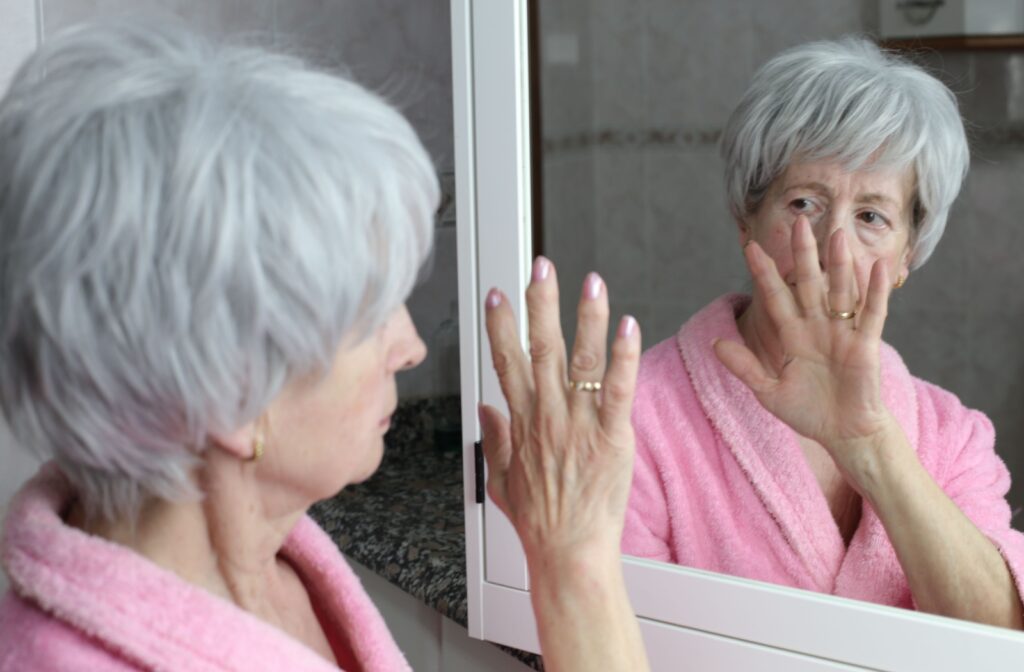Hallucinations in seniors can be a source of confusion, worry, and even fear—for both the person experiencing them and the loved ones tasked with offering care. These episodes can disrupt daily life and make otherwise manageable tasks feel overwhelming. There are a number of reasons for hallucinations, such as medications, sleep loss, and sensory deprivation.
As caregivers, understanding what hallucinations are, their potential causes, and how to respond with compassion can make all the difference. That’s why at Boulder Pond, we focus on creating an environment of trust, compassion, and respect. Let’s explore the types of hallucinations seniors may experience, what might cause them, and how caregivers can provide informed, thoughtful support.
What Is a Hallucination?
Hallucinations are sensory experiences that feel very real to the individual but are entirely created by the mind. These can affect any of the senses and vary greatly in intensity and duration. A hallucination can be as fleeting as seeing a shadow out of the corner of one’s eye or as vivid as hearing voices that seem genuinely present.
For seniors, hallucinations can cause:
- Confusion and disorientation
- Anxiety or fear
- Distress and agitation
- Behavioral changes
- Difficulty distinguishing reality from illusion
- Social withdrawal
- Sleep disruptions
Compounding the challenge is that hallucinations feel completely real to the person experiencing them. For this reason, it’s critical to respond to hallucinations with care, understanding, and informed action.
Types of Hallucinations
Hallucinations can affect any of the senses, and each type may require a unique approach to manage. Knowing the distinctions between them can help caregivers better understand what their loved one is experiencing.
Here are the main types of hallucinations:
1. Visual Hallucinations
These are the most common among seniors. Visual hallucinations involve seeing things that aren’t there, such as people, animals, or objects. These often occur with conditions like dementia or sensory loss.
2. Auditory Hallucinations
Auditory hallucinations involve hearing voices, sounds, or music that isn’t present. This can be particularly troubling for seniors, often leading to confusion or distress.
3. Tactile Hallucinations
Tactile hallucinations involve the sensation of touch. A senior might feel as though someone is stroking their arm or as if bugs are crawling on their skin.
4. Olfactory Hallucinations
These involve smelling odors that don’t exist, such as burning rubber or rotten food. These can trigger anxiety, especially if the person believes there is a danger nearby.
5. Gustatory Hallucinations
These are less common and involve tasting something that isn’t there, such as unpleasant metallic or sour flavors.
6. Somatic Hallucinations
These are sensations felt within the body, such as the feeling of movement or a foreign object beneath the skin.
Each type of hallucination presents unique challenges. Seniors may react with fear, agitation, or even aggression, especially if their reality feels under threat. Understanding the underlying cause is key to assessing and managing their condition.
Causes of Hallucinations
Hallucinations in seniors are almost always rooted in changes to the brain or body. Identifying the cause can help you support your loved one effectively and determine whether professional care is needed.
Here are the most common causes behind hallucinations in older adults:
Dementia
One of the leading causes of hallucinations is dementia, including Alzheimer’s disease and Lewy body dementia. These conditions damage brain cells, altering perception and causing vivid, often disturbing hallucinations.
Seniors with dementia may begin to confuse memories with current events or see people who are no longer there. If this sounds familiar, it might be time to consider memory care, where trained professionals can help your loved one feel safe and secure.
Medication
Older adults often take a variety of medications to manage chronic conditions, and certain drugs can trigger hallucinations. Common culprits include:
- Antibiotics
- Muscle relaxants
- Antipsychotics
- Anti-seizure medications
- Parkinson’s medications
Combining medications can amplify these effects. Hallucinations linked to medication typically occur shortly after a new prescription is introduced. If you suspect medication is causing hallucinations, contact your loved one’s physician immediately.
Sleep Deprivation
Sleep plays a vital role in maintaining a healthy mind. Prolonged sleep deprivation can impair the brain’s ability to function, sometimes leading to hallucinations.
- Encourage a healthy sleep routine by maintaining consistent sleeping and waking hours.
- Create a calming evening environment by minimizing noise and bright lights.
- Limit caffeine and heavy meals before bedtime.
- Promote regular physical activity to help regulate sleep cycles.
Prioritizing rest can help reduce or eliminate sleep-related hallucinations.
Sensory Loss
Hearing and vision loss are common as we age, and these changes can contribute to hallucinations. For example:
- Poor eyesight can cause misinterpretations of visual stimuli.
- Hearing loss may lead the mind to confuse silence with indistinct sounds or voices.
When sensory input decreases, the brain often tries to fill the gaps, which can result in hallucinations.Tools like hearing aids and eyeglasses can greatly improve your loved one’s quality of life and reduce confusion.
Other Contributing Factors
Additional causes of hallucinations in seniors can include dehydration, infections like UTIs, low blood sugar, and mental health conditions. Early detection and intervention are essential to manage these symptoms effectively.
Supporting a Loved One Experiencing Hallucinations

Caring for a senior experiencing hallucinations can be emotionally and physically taxing. Here are some ways to provide compassionate support:
- Stay calm and patient to ease their anxiety or fear.
- Gently reassure them without dismissing their experience.
- Identify triggers like specific medications or situations that might be contributing.
- Consider professional care if the hallucinations become frequent or severe.
If you feel overwhelmed, know that you don’t have to face this alone. Memory care communities and senior living options offer tailored support from trained caregivers who understand how to manage these challenges.
Helping Seniors Live Comfortably & Safely
Hallucinations don’t just affect the person experiencing them—they also impact families and caregivers. By understanding the various causes and effects of hallucinations in seniors, you can take steps to ease their distress and foster a sense of security.
If you’re feeling uncertain about how to provide the best care for your loved one, we’re here to help. At Boulder Pond, our experienced team offers dedicated support and memory care for seniors facing dementia or other cognitive challenges.Contact us today to learn more or schedule a visit to see how we can support your family.



